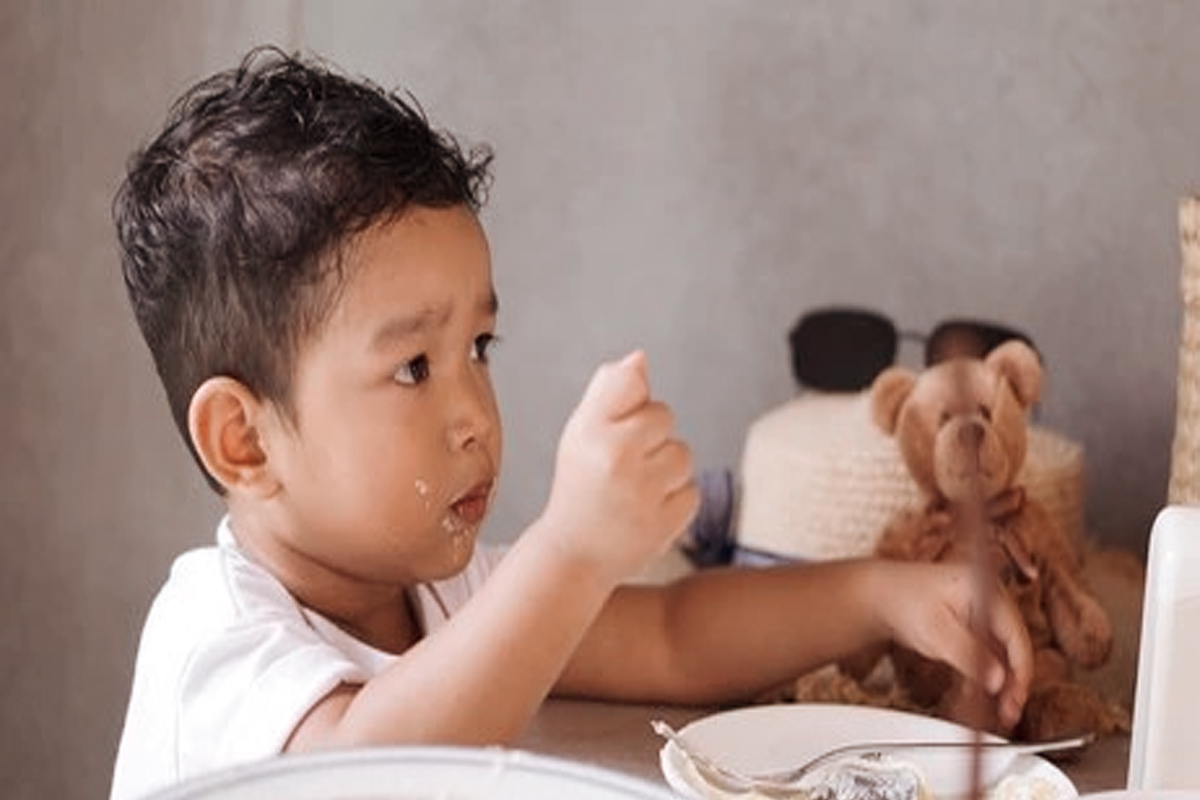As your baby reaches the sixth month of life, a tapestry of remarkable developments and milestones unfolds, showcasing the exciting journey of growth. At this stage, your little one is likely to exhibit an array of new skills and behaviors that reflect their emerging abilities. From motor skills to social interactions, let’s explore the captivating world of your six-month-old baby’s development.
Table of Contents
ToggleWhat are the Baby’s Development and Milestones on the 6th Month
At 6 months old, babies experience various developmental milestones, including physical, cognitive, and social-emotional development. Some of these milestones include:
Physical and Cognitive Development:
- Improved vision. Babies can now see objects more clearly and track them.
- Neck strength. Babies can hold their heads steady without support and may start to sit up with support.
- Muscle control and hand-eye coordination. Babies can grab and shake toys and rattles, and may soon be able to pass objects from one hand to another.
- Rolling over. Babies may start to roll over from their backs to their sides and vice versa.
- Sitting. Babies may begin to sit up on their own, supported by their heads.
Social and Emotional Development.
- They increased social interaction. Babies enjoy playing with others and may try copying your movements and facial expressions.
- Babbling. Babies may start to babble and make more sounds.
- Displaying joy and displeasure. Babies can express emotions such as happiness and displeasure.
What are the activities needed to Support your 6-month-old baby’s development
Peekaboo
- Playing peekaboo can help develop a baby’s cognitive skills, such as object permanence.
Tummy Time
- Tummy time can help strengthen a baby’s neck, shoulder, and arm muscles, which are essential for crawling and sitting up.
Reading
- Reading colorful picture books can help develop a baby’s language and listening skills.
Stacking
- Stacking toys like blocks, cups, or rings can help develop a baby’s hand-eye coordination and fine motor skills.
Puzzles
- Simple puzzles with large pieces can help develop a baby’s problem-solving and cognitive skills.
Clapping and Banging
- Encouraging a baby to clap and bang objects together can help develop their hand-eye coordination and fine motor skills.
Singing and Rhyming
- Singing and reciting nursery rhymes can help develop a baby’s language and listening skills.
Dancing
- Dancing with a baby can help develop their balance, coordination, and gross motor skills.
Playing with Balls
- Rolling and playing with balls can help develop a baby’s hand-eye coordination and gross motor skills.
Exploring with Senses
- Providing a variety of textures, colors, and sounds for a baby to explore can help develop their sensory skills.
Playing with Bubbles
- Blowing bubbles can help develop a baby’s visual tracking and hand-eye coordination.
How to Feed Your 6-Month-Old Baby
Breast Milk or Formula
- Breast milk or formula should still be the primary source of nutrition for a 6-month-old baby.
- Babies this age should be taking about 6 to 8 ounces of formula or expressed milk around 5 to 7 times a day
Introduction of Solid Foods
- Begin with iron-fortified infant single-grain cereal mixed with breast milk or formula
- You can also offer pureed fruits and vegetables
Feeding Schedule
- Babies this age typically need to eat every 2-3 hours or about 5-6 times per day
- Once a baby is enjoying their once-a-day solids, the frequency can increase to two and then three times a day
Feeding Solid Foods
- Offer a variety of foods from all the food groups and be patient
How Much Sleep Does Your 6-Month-Old Baby Need
Nighttime Sleep
- Aim for around 10 to 12 hours of uninterrupted nighttime sleep. Create a calming bedtime routine to signal to your baby that it’s time to sleep.
Naps
- Encourage two to three naps during the day, with each nap lasting about 1 to 3 hours. Pay attention to your baby’s cues to determine the ideal nap duration.
Bedtime Routine
- Develop a soothing bedtime routine, including activities like a warm bath, gentle lullabies, or a bedtime story. This helps signal to your baby that it’s time to wind down.
Day in the Life of a 6-Month-Old Baby
Feeding
- Baby’s feeding schedule typically involves 5-6 feedings per day, with a combination of breast milk, formula, and the introduction of solid foods
- Breastfed babies may nurse 5-6 times a day
- Formula-fed babies may have 5-6 bottles per day, with each feeding consisting of about 6-8 ounces
Sleeping
- 11-12 hours of nighttime sleep
- 2.5-3.5 hours of daytime sleep, spread out over 3 naps
Bathing
- Bathing a baby 2-3 times a week to prevent their skin from drying out
- Ensure that the water temperature is warm and safe, and use mild, neutral-pH soaps without additives
Changing Diapers
- Typically needs to be changed every 2-3 hours, or about 5-6 diapers a day
- Playtime Diaper Duty. Engage in interactive playtime. Be prepared for diaper changes during or after play sessions, as the excitement can sometimes lead to surprises
Playing
- Stacking. Stacking toys like blocks, cups, or rings can help develop a baby’s hand-eye coordination and fine motor skills
- Puzzles. Simple puzzles with large pieces can help develop a baby’s problem-solving and cognitive skills
- Clapping and Banging. Encouraging a baby to clap and bang objects together can help develop their hand-eye coordination and fine motor skills
- Singing and Rhyming. Singing and reciting nursery rhymes can help develop a baby’s language and listening skills
Fun Facts
- A 6-month-old typically wakes up with infectious smiles, ready to start the day with joy and enthusiasm
Items Needed on the 6th Month of Your Baby
Feeding Essentials
- Baby food (introduce appropriate solids as per pediatrician’s guidance)
- Feeding bowls and spoons
- High chair or booster seat
Diapering Supplies
- Diapers (size-appropriate)
- Wipes
- Diaper rash cream
- Changing pad
Clothing
- Onesies and comfortable outfits
- Bibs for mealtime mess
Baby Bath Essentials
- Baby bathtub or suitable transition to the regular bath
- Baby-safe soap and shampoo
- Soft hooded towels
Sleeping Gear
- Crib or playpen
- Fitted sheets
- Sleep sacks or lightweight blankets
Health and Safety
- Baby-safe sunscreen for outdoor activities
- Baby thermometer
- Childproofing essentials for your home
- Baby first aid kit
Play and Development
- Age-appropriate toys to encourage exploration and sensory development
- Baby-friendly books for interactive reading
- Playmat for floor play
Parental Comfort
- A nursing pillow or support for feeding
- Comfortable chair for feeding and bonding
- Consider postpartum self-care items as needed
Life as a Parent on Baby’s 6th Month
Entering the sixth month of parenthood marks a significant milestone in your journey, characterized by a deeper understanding of your baby’s unique personality and needs. As a parent during this stage, the established routine becomes a reliable foundation, allowing for a smoother navigation of daily life with your growing infant. Sleep patterns tend to stabilize, providing a welcome reprieve and a more restful atmosphere for both you and your baby. Interactions become increasingly dynamic, with your little one showcasing new developments such as sitting up or reaching for objects, enriching your shared experiences. The support network continues to play a crucial role, offering valuable insights and camaraderie as you embrace the challenges and joys of parenting. Prioritizing self-care remains pivotal, ensuring that you maintain the resilience needed to nurture your baby. Celebrate the evolving achievements, from the first taste of solid food to the expanding repertoire of sounds and expressions. Adaptability remains a constant as your baby’s cues shift, requiring ongoing adjustments in your parenting approach. Regular health check-ups contribute to the assurance of your baby’s continued well-being. Embrace the uniqueness of the sixth month, savoring the ever-changing dynamics of parenthood and the shared moments of growth and discovery.
Checklist for the 6th Month of Your Baby
Babyproof your home
- Ensure that your home is safe for your baby by baby-proofing it. You can find lots of information on baby proofing online.
Schedule and go to your baby’s 6-month checkup
- Attend your baby’s 6-month checkup and ask the provider about any upcoming immunizations your baby needs.
Feeding Milestones
- Introduce a variety of single-ingredient solid foods while continuing breast milk or formula. Monitor for any allergic reactions.
Sleeping Habits
- Continue fostering healthy sleep habits with a consistent bedtime routine. Aim for 10-12 hours of nighttime sleep and 2-3 naps during the day.
Teething Awareness
- Look out for signs of teething discomfort and have teething toys or soothing remedies on hand.
Immunization Schedule
- Stay updated on your baby’s immunizations. Consult with the pediatrician to ensure vaccinations are on track.
Last Updated on January 15, 2024
Written By
With a solid foundation in family dynamics, child development, and a knack for assessing products, our content is built on a strong grasp of our topics. We use trustworthy sources, seek advice from experts, and stay current with the latest happenings in our fields. We always give credit to our sources, reveal any possible conflicts of interest, and deliver info in a truthful and unbiased way. Follow us on Facebook or join our Facebook Group.
Start your journey to confident parenting
Join over 2,000+ parents who receive free practical advice and tips from Joyful PH. Unsubscribe anytime.
You may also like
Toddler’s Development and Milestones at 24th Month
A two-year-old's growth and achievements at 24 months are remarkable. Toddlers…
Toddler’s Development and Milestones at 23rd Month
In the 23rd month, toddlers exhibit significant developmental strides. Their…
Toddler’s Development and Milestones at 22nd Month
At 22 months, toddlers make strides in independence, speech, and motor skills.…
Toddler’s Development and Milestones at 21st Month
During the 21st month, toddlers continue their dynamic development. Language…
Toddler’s Development and Milestones at 20th Month
At 20 months, toddlers exhibit remarkable progress. Their language skills…
Toddler’s Development and Milestones at 19th Month
A toddler at 19 months undergoes significant development. Language skills…







